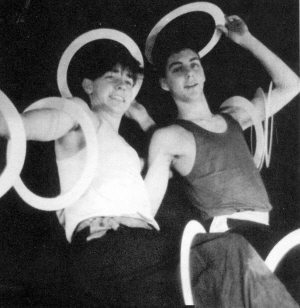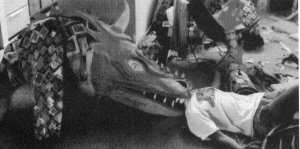 |
|
 |
|
Page 20 Spring 1996
|
MF:
I've performed in teeterboard acts and trampoline routines through the
years, and I'm still active in acrobatics. I'm working now with some
guys toward performing a
It's
just sort of a hobby, but it's a lot of fun. It's like flying when you
get shot off a teeter board,
it launches you up there about 20-25 feet. It has taken years of
practice to arrive at the point where I have a coherent sense of air
space, to know where I am in the air. Turning one flip is one thing,
but when you start doing more it takes a lot of practice.
MW:
Do you feel like your juggling and gymnastics feed each other? MF:
Not really. There's not much comparison between gymnastics and
juggling. You can't
combine the two at all in performance, and I treat them pretty
separately. Juggling is
I
enjoy the creativity of juggling and the sense of meditation within
it. In trampoline, though, the zen is very rapid. You can practice
tricks for hours, but with the trampoline and teeterboard things
happen less frequently and quicker. You get a big endorphine,
adrenaline rush from the teeterboard and trampoline that you don't
experience once you've juggled anything for a while - even knives or
torches.
MW:
How was it that you and Curt parted paths ? MF:
I choreographed a club routine that was actually somewhat similar to
what Curt and I competed with in 1988 in Denver at the IJA festival.
It was done with comedy and music, and it ended with eight clubs in
the black light. We also added a three ball routine, so, instead of
just having Carter's hoop juggling act we had club passing and balls.
I
was also pretty much prop master for the act, and built the magic
illusions, the big dragon "Alfonso," some of the things we
had for spirits and the black light routines. Alfonso came about one
day when Carter said, "I'd like a dragon." So I started
working on it. The first conception was pretty pitiful, but you learn
from your mistakes and I rebuilt it three or four times until it
looked pretty good and held together on stage.
MW:
When you parted ways with Carter did you immediately cool out for a
while? How did you get from that point to the Jim Rose Circus Side
Show? MF:
I worked Lazer Vaudeville for about
three years, then came back to Chicago. I was just taking a
break and somebody mentioned that Jim Rose's show was coming to town.
It sounded interesting so I called up Jim and talked to him about how
I might fit into the show. MW:
You just took it upon yourself to call Jim Rose because you
thought you might fit
in?! That's pretty direct marketing! MF: Thanks. That's how I do all my stuff.
MW:
I would've never thought to call the guy. MF:
No. I didn't really know about the show so I I
saw the show and felt like I
That
was all he needed to see! He said later that was the trick that
stunned him, that sealed the deal.
MW:
That sounds like an
incredible trick. How do you go about learning it? MF:
I had done cigarette tricks for a long time, like throwing it behind
my back to catch it in my mouth, and putting a lit cigarette on my
foot and kicking it up. But learning to catch the lit match was the
hard part! It really made me respect Bobby May because it's an amazing
trick. Bobby used to close out his act with it.
It
was hard to learn and I did bum myself a few times. But after a while
I got to where I could
recognize the match rotation enough to get out of the way or
blow it away from my face if it wasn't coming in right. There are
little things you can do to make it easier, like spinning the match a
little to help it turn. I tried a bunch of different brands, but ended
up using regular blue tip wooden kitchen matches. I only know of two
other people beside me who do it now - Barnaby in the Southwest and a
performer with Cirque Archaos. |
 |
|
 |
|
|
|